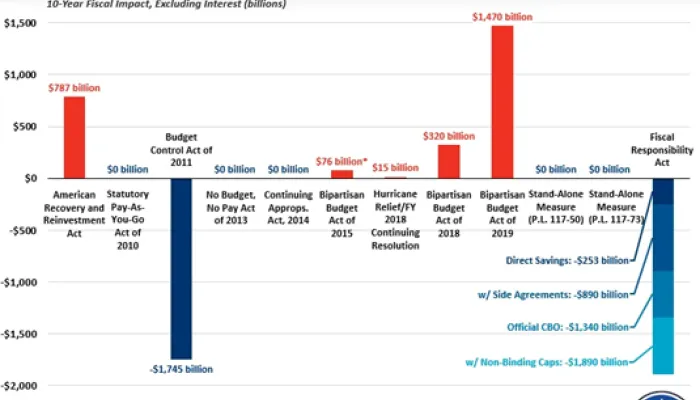Now is the Right Time for a Bipartisan Fiscal Commission
The House Budget Committee is scheduled to mark up the Fiscal Commission Act of 2024, a bill introduced by Representatives Bill Huizenga (R-MI) and Scott Peters (D-CA), co-chairs of the Bipartisan Fiscal Forum, that would create a bipartisan fiscal commission to address the unsustainable rise in the national debt as well as ailing federal trust funds.
Senators Joe Manchin (D-WV) and Mitt Romney (R-UT) have introduced a similar bill, the Fiscal Stability Act. The bills combined have the support of 33 bipartisan lawmakers. In addition, bipartisan member groups like the Bipartisan Fiscal Forum and the Problem Solvers Caucus have indicated their support for a commission. Further, ideologically diverse groups and individuals have expressed their support for a fiscal commission recently, including former Senators Rob Portman (R-OH) and Kent Conrad (D-ND), former Secretary of Defense Leon Panetta, and former Senator Heidi Heitkamp (D-ND).
The following is a statement from Maya MacGuineas, president of the Committee for a Responsible Federal Budget:
We commend Chairman Arrington and Representatives Huizenga and Peters for their critical work on establishing a fiscal commission. With the national debt headed toward record levels as a share of the economy, it is important that we get to work on stabilizing the debt and ultimately putting it on a downward path.
A bipartisan fiscal commission would give the country’s dire fiscal situation the proper attention it deserves. In the last two decades, the national debt has tripled as a share of the economy, and modest surpluses at the start of the millennium have been replaced with $2 trillion annual deficits.
We’re headed towards uncharted territory if we don’t do something soon. Interest on the debt is already the fastest-growing part of the budget and more than we spend on children or Medicaid. In three years, we’ll spend more on interest than national defense, and by mid-century, interest will be the largest line item in the entire federal budget. Meanwhile, the Social Security, Medicare Hospital Insurance, and Highway trust funds are all headed toward insolvency within a decade. Without changes, the average couple retiring in 2033 will receive a $17,400 cut in their Social Security benefits, regardless of need.
Establishing a commission won’t solve these problems. But it will give policymakers the opportunity to at least discuss them seriously, and hopefully identify policy solutions that Congress can then enact into law. Commissions have worked in the past, and a new commission is probably our best current hope for curing our fiscal woes.
###
For more information, please contact Matt Klucher, Assistant Director for Media Relations, at klucher@crfb.org.


